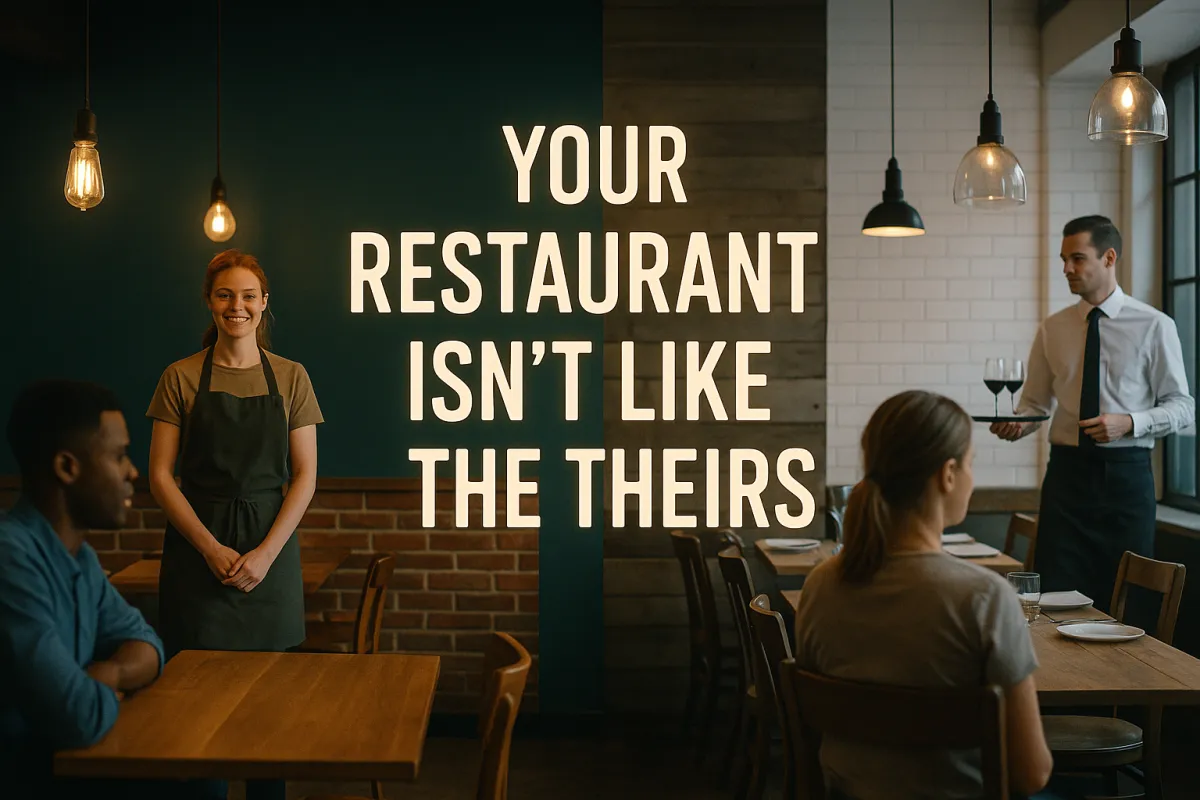
Your Restaurant Isn't Like Theirs (And That's the Point)
The copying trap is everywhere.
Walk into any restaurant district and you'll see it: the same Edison bulb fixtures, the same reclaimed wood tables, the same "craft" this and "artisanal" that. Everyone copying everyone else, hoping that mimicry leads to success.
But copying doesn't get you very far.
Sure, it feels safer. Less risky. You can point to that trendy place down the street and say, "See? They're doing it, so we should too." But when everyone is zigging, the real opportunity is in the zag.
The Story We Tell Ourselves
Here's the story most restaurant owners tell themselves: "If we just get the food right, everything else will follow."
But that's not the whole story, is it?
The whole story includes the 16-year-old server who lights up when talking about the daily special. The line cook who stays late to perfect a sauce nobody will ever see him make. The manager who remembers that Table 12 celebrated their anniversary here last year.
Success in restaurants isn't just about food—it's about people.
The story we tell ourselves matters because it shapes every decision we make. If your story is "we're just like that successful place," then you've already lost. If your story is "we're the only place that does this thing, for these people, in this way"—now we're getting somewhere.
What Are the Odds?
What are the odds that your restaurant will succeed by doing exactly what everyone else is doing? Pretty slim.
What are the odds that you'll create something remarkable by focusing on the right people, asking better questions, and having the courage to be different? Pretty good, actually.
Take tipping. Everyone accepts it as gospel. "That's just how restaurants work." But what if it isn't working? What if tipping creates the very divisions that tear your team apart?
The front-of-house team walks home with $200 in cash while the chef who created the magic makes $15 an hour. The dishwasher who keeps everything running never sees a dime of appreciation. Is this the culture you want to build?
Most owners avoid this conversation. It's easier to maintain the status quo than to question it. But avoidance of the difficult conversations is exactly what keeps you ordinary.
Where Did You Get Your Special Powers?
Every restaurant that matters has special powers. Not the kind you get from a consultant's playbook or a franchise manual. The kind that comes from deep understanding of what you're actually trying to accomplish.
Your special powers might be:
Knowing that your community craves connection, not just food
Understanding that your staff's financial stress affects every customer interaction
Seeing that equality creates better culture than hierarchy
Recognizing that removing friction (like the awkward tipping calculation) improves the entire experience
But here's the thing about special powers: the best way we learn is rarely the best way to perform.
You might have learned the restaurant business by copying others, by following industry "best practices," by doing what you thought you were supposed to do. That's fine for learning. But performing—creating something that matters—requires you to unlearn some of those lessons.
The Courage to Lead Differently
There is nothing to judge here. This is your creation. Your restaurant. Your people. Your culture.
The customer is always part of the journey, but it starts with you having the courage to lead differently. To ask the questions others won't ask. To see opportunities where others see only risk.
Maybe that means eliminating tipping and building service into your prices. Maybe it means creating a culture where everyone wins when the restaurant wins. Maybe it means being the place that does things differently—and explaining why that difference matters.
The market rewards authenticity, not imitation. It rewards clarity, not confusion. It rewards the courage to be different, not the safety of being the same.
Your restaurant isn't like theirs. And that's exactly the point.
What story are you telling yourself about your restaurant? What special powers are you afraid to use? The answers to these questions might be the difference between another me-too restaurant and something truly remarkable.